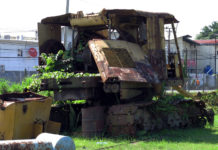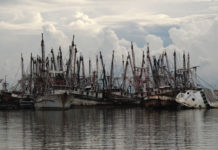
When Wild Bill arrived in Bocas del Toro, killed five members of the expatriate community, stole their houses, pilfered their assets, then fled into the darkened interior of Central America, almost two decades had passed since the archipelago’s first property boom. Gringo dollars flowed like wine at a village fiesta. The police were warm and drowsy. And there was a widely agreed unspoken rule regarding one’s business and buried history. In sum: no questions asked. Wild Bill, the latter day pirate, had come home.
***
I was slung in a hammock in a half-fallen shack on the water. A procession of rickety grey piers jutted over the bay, threatening collapse under the terminal tropical torpor. Bocas Town, the indolent island capital of Panama’s far-flung Bocas del Toro province, was fading to blurry smudge of spent beer bottles and flickering porch lights.
Nearby, in a half-built Pentecostal church, the minister was attending his flock with a viscous Caribbean drawl, words pouring like sour coconut milk into the night.
“And God saw that the wickedness of man was great in the earth,” he said. “…and that his every thought was only evil. And it repented the Lord that he had made man on the earth. And it grieved him – yes, it grieved him at his heart! I shall rub him out, cried the Lord! I shall smite him!”
The congregation grew animated under his spell, whooping and braying and praying for salvation. Arms raised to the rafters, heavens beseeched, their bodies began to jerk and tremble with spiritual charge:
“Hallelujah! Hallelujah! Hallelujah!”
Inside my head, lines of prose chased themselves in erratic, ever-decreasing orbits, tangling impossibly in the folds of my darkening cerebellum. I sensed the onset of a monster migraine.
“Even now,” said a voice from my Dictaphone, as I played back snippets of interviews. “When I think about it… it’s just so bizarre… I know two people who were killed by this maniac… in your lifetime, you just don’t expect something like that… ”
But for me, the morbid thrill of investigating Panama’s first serial killer, Wild Bill, was quickly fading. I was awash with notes, papers, jottings, cuttings. Two dozen leads leading precisely to nowhere. A hundred unanswered questions. Half-formed meditations. Wild, abortive monologues on the nature of darkness and evil. I had nothing. Absolutely nothing.

Pirates and Paradise Islands
“When Christopher Columbus sailed these emerald isles in 1502, he found neither gold nor a passage to India. Instead he discovered a scintillating natural treasure that many are calling ‘The Galapagos of the 21st Century’. Whether you’re seeking the perfect retirement destination, or simply a solid investment venture, Bocas is the place to be …”
– Fantasy Island Investment Corp
The year was 1989.
The United States had finally dumped its quarrelsome business partner, President Manuel Noriega, along with his vicious cohorts in the Guardia Nacional. Panama’s new-found stability was lending credibility to a nation otherwise famed for its insalubrious tropical diseases, its military dictators, its transoceanic canal, and its drug lords. Waves of foreigners arrived, speculating with a view to accumulating.
Few places were as ripe for exploitation as the verdant atolls of the Bocas del Toro archipelago: a chain of rum-soaked Caribbean islands steeped in grandiose legends of pirates. It was a tourist developers dream. Dazzling white sand beaches, kaleidoscopic coral reefs, teeming rainforests and lost-in-time Creole villages drew the frenzied attentions of blood-thirsty land grabbers.
“Come to the Paradise Islands of Bocas del Toro,” they cried. “Central America’s best kept secret!”
But what no investment broker ever admitted about Panama — or Central America generally — is its peculiar appeal to the social failures of the north. Scammers, swindlers, crooks, and criminals are as prolific as vultures at the roadside.
The White Supremacist Flees South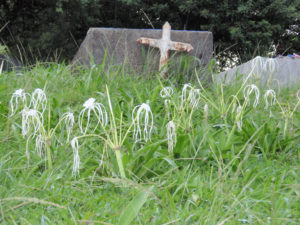
I wondered, vaguely, if Wild Bill suffered torments. Did night terrors consume him? Did he writhe, delirious, at the mercy of strange fevers? A savage burst of lightening illuminated the shack, casting thick bars of shadow on my flesh.
“His killing… ” Douglas Ruscher, a friend of the victims, had told me one afternoon at his hotel in Bocas Town. “He did that almost in a professional way. The way he plotted, he did a lot of studying of people. But I think he liked to kill. I think it’s something he enjoyed.”
In many ways, Bill fit the profile of a classic profit killer: all his murders were planned, all were motivated by material gain, all were directed at acquaintances. Equally, it was easy to believe he had derived a twisted pleasure from his slayings.
Born William Dathen Holbert in Hendersonville, North Carolina, 1979, Bill struggled with rejections until he found purpose and meaning in the shady meeting halls of his local White Supremacy chapter. He shaved his head, pumped iron, drank voraciously and jacked up on steroids. He opened a shop and sold fascist memorabilia to his Great White Brothers, dreaming of the day when the Great White Southern Race would once again rise to greatness.
“We believe our culture is the pinnacle of achievement in western society,” he said on-camera in 2005, with no hint of irony or sarcasm.
Clearly, Bill was not a refined or educated man. But what he lacked in charm, he made up for with force. The power of flesh, the charge of adrenalin, the Viking roar and the call of the wild, all that he understood. And guns, of course. What kind of southerner would he be without his guns?
Wild Bill…the outlaw, gun-slinger, slayer, butcher and bandit ultimately answered to two great demons of old: Greed and Domination.
When Wild Bill wasn’t bowed prostrate to the Confederate flag, he engaged a minor fascination with Satan. Petty crime, meanwhile, paid the bills.
In 2006, he narrowly escaped arrest in the United States for a host of misdemeanours including real estate fraud. Following a high-speed chase by the authorities, he fled south of the border with his girlfriend in tow, Laura Michelle Reese. They hid out in Costa Rica, let their hair grow long, got hitched and acquired fake passports. Holbert and Reese became William Adolfo and Jane Seana Cortez. In July 2007, they entered Panama and settled in the highland town of Volcán.

Panama House for Sale: 3 Bullets
One day, Bill answered a for sale advert on the classifieds website Craigslist. A US-expat, Mike Brown, whose real name was Mike Salem, was selling his house in Bocas del Toro. Brown was a retired drug peddler with connections to powerful Asian cartels. He’d been on the run for three decades.
Brown invited Bill and Jane to view his family house in Aguacate — an isolated enclave on a peninsula aptly named Cerro de la Bruja, or Witch’s hill. For three days and nights they partied. On the fourth day, Bill took his 38-caliber revolver and shot Mike Brown, his wife and his 16 year old son, Watson, in the back of the neck. He dug various holes in the garden, buried the evidence and made himself at home.
Bill set about insinuating himself into the expat community. He transformed the Brown family home into a tawdry hotel-bar — the Hacienda Cortez — complete with garish skull-and-crossbones and a banner bearing the words “Lucifer’s Slave.” Locals described the atmosphere as “unusual” and “not quite right.”
Jolly Roger Social Club
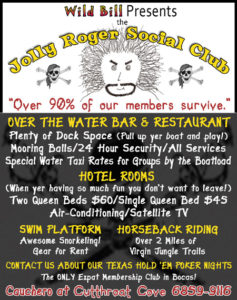 The slogan he used to publicise his debauched “members only” drinking club, the so-called Jolly Roger Social Club, said it all:
The slogan he used to publicise his debauched “members only” drinking club, the so-called Jolly Roger Social Club, said it all:
“Over 90% of our members make it out alive.”
Although unusual, Bill was not unpopular. He kept a loyal court of colorful wastrels, clowns, and petty outlaws. But the self-declared Minister of the First Church of the Inebriation was consumed by ego as much as he was by ethanol-based beverages. He revelled in the secret knowledge of who he was, what he had done, and indeed, what he intended to do.
“Now I’ve got a licensed firearm,” he used to jokingly tell his Jolly Roger affiliates. “I’m gonna shoot some of you gringo jerks!”
Even Jane, normally silent and mousey, couldn’t resist making sadistic hints:
“There’s things goin’ on in here Bocas that’s gonna make your blood curdle,” she is reported to have said. “People are gonna be completely freaked out!”
Say Hello to My Lawyers, Smith & Wesson
Bill and Jane Cortez slowly leeched Mike Brown’s bank accounts, cashing in his savings for expensive toys like speed boats, cars, trucks and AK-47s. As far the neighbors were concerned, Bill was the son of a wealthy Mexican diplomat.
“I’m solvent.” He boasted. “I don’t need to work. It’s just fun.”
Psychopathically speaking, Bill was languishing in a so-called cool-off period. For two years, he did not kill again. And then, one day, driven by dwindling funds and lingering alcoholic rot, he struck once more.
Bo Icelar was from Santa Fe, New Mexico. His friend, Douglas Ruscher, described him as an interesting and cultured man, well-travelled and bohemian. He enjoyed blues and jazz, had several black-belts in the martial arts and maintained a phenomenal art collection at his home in Big Creek, just outside of Bocas Town.

Bo had been trying to sell his house for months and believed he had a potential buyer in Bill Cortez. On the morning of November 30, 2009, Bo took breakfast in Lili’s Cafe in Bocas Town. Bill and Jane arrived soon after to escort Bo to a meeting with their “lawyer.” No one saw Bo alive ever again.
The next day, Bill moved into his Bo’s house in Big Creek and when a worker showed up to fulfil a painting contract, Bill barked at him from the balcony:
“What the hell do you want? Bo doesn’t live here anymore. He sold the house to me yesterday. ”
Bo’s disappearance, although it was sudden, prompted no questions. If anything, Bocas is transitory, and besides, Bo was a reclusive character and given to bouts of eccentricity.
“Taking off without any warning was the kind of thing Bo might actually do.” Douglas told me.
The truth was, Bill had murdered Bo and buried him under a trash pile at the Hacienda Cortez. If he had just stopped there, he might gotten away with it. But after only two and a half months, he killed again. Both his timing and his choice of victim were uncharacteristically reckless.
The Lament of Jack the Wonder Dog
Cher Hughes was a sparkling, lively woman. Her friends, Chris and Sandi Hodge, described her as positive, fun-loving and well-liked by the community. She had a winning smile and an adventurous sprit. She loved children, but had none of her own. She also loved animals, and kept a pack of good-tempered hounds. Jack, a slender black Doberman, was her most loyal.
In early 2010, Cher was recently separated from her husband Keith Werle and lived alone at her private island home in Cauchero, a mile or so from the Hacienda Cortez.
“We were neighbors with Wild Bill and his wife,” explained Keith. “We used to have them over for dinner.”
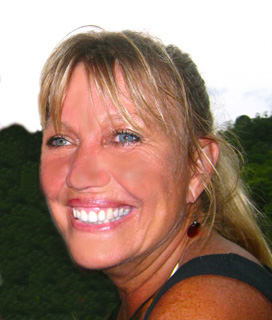 On March 23rd, 2010, Bill invited Cher to his house, and at around 8.00pm, called her outside to look at the sloths. When her back was turned, he pulled out his gun, aimed and fired.
On March 23rd, 2010, Bill invited Cher to his house, and at around 8.00pm, called her outside to look at the sloths. When her back was turned, he pulled out his gun, aimed and fired.
Why did Wild Bill prey on Cher, a woman who would be so obviously missed? Was it vanity? Pride? Or simple drunken misjudgement? As a psychopath, he was unable to feel empathy or experience true friendship, and hence, may not have comprehended the intimate nature of Cher’s own friendships. Few could accept her sudden and unannounced departure.
On June 20th, police finally responded to ongoing pleas from Cher’s friends and family. They dispatched a team of investigators to look into Cher’s disappearance and landed at Hacienda Cortez. Jack the Doberman was visibly distressed. They followed him into the garden where he lay down on a pile of freshly turned soil. The investigators dug.
One by one they extracted the decomposed remains of Cher Hughes, Bo Icelar and the Brown family. Inside the house, they discovered numerous documents pertaining to finances, assorted weaponry, satanic literature, and a jar filled with human teeth. Both Wild Bill and his accomplice, Jane Cortez, were gone.
Capture
Bill and Jane’s Central American sojourn ended much like it began — with a high-speed chase and a dash for an international border. This time they failed to escape. On July 26th 2010, the Nicaraguan army apprehended the couple as they made a break for the jungle-shrouded San Juan river. Clapped in chains and escorted back to Panama, the pair were paraded before the cameras like a pair of circus curiosities.
Once in police custody, Bill confessed to everything. Laura Reese, aka Jane Cortez, denied any involvement in the murders. The pair are awaiting trial in David, western Panama.
Meanwhile, in the days following the grizzly exhumation at Hacienda Cortez, Bocas went into shock. People fell silent, horrified and uncertain. As Sandi Hodge famously said to ABC news:
“We think we know one another — but no, not really…”
But if that is true of Bocas, it is true of anywhere. From suburban London to outback Australia, monsters lurk in the most of prosaic places – why not Bocas too? Of course, the mean joke between salty expatriates — which can only be understood in light of Panama’s unusually jaded love-hate relationship with the United States — is that the country’s first serial killer just had to be American.
Another Rainy Night in Panama
Back at my cabin, a relentless deluge had settled over the island. Giant droplets pelted the tin roof. Wind clattered the clapboard walls. Waves washed over the deck. Tree trunks, branches and random flotsam collided with the floor boards. The whole dilapidated structure banged and creaked and shook, threatening to break away into the torment.
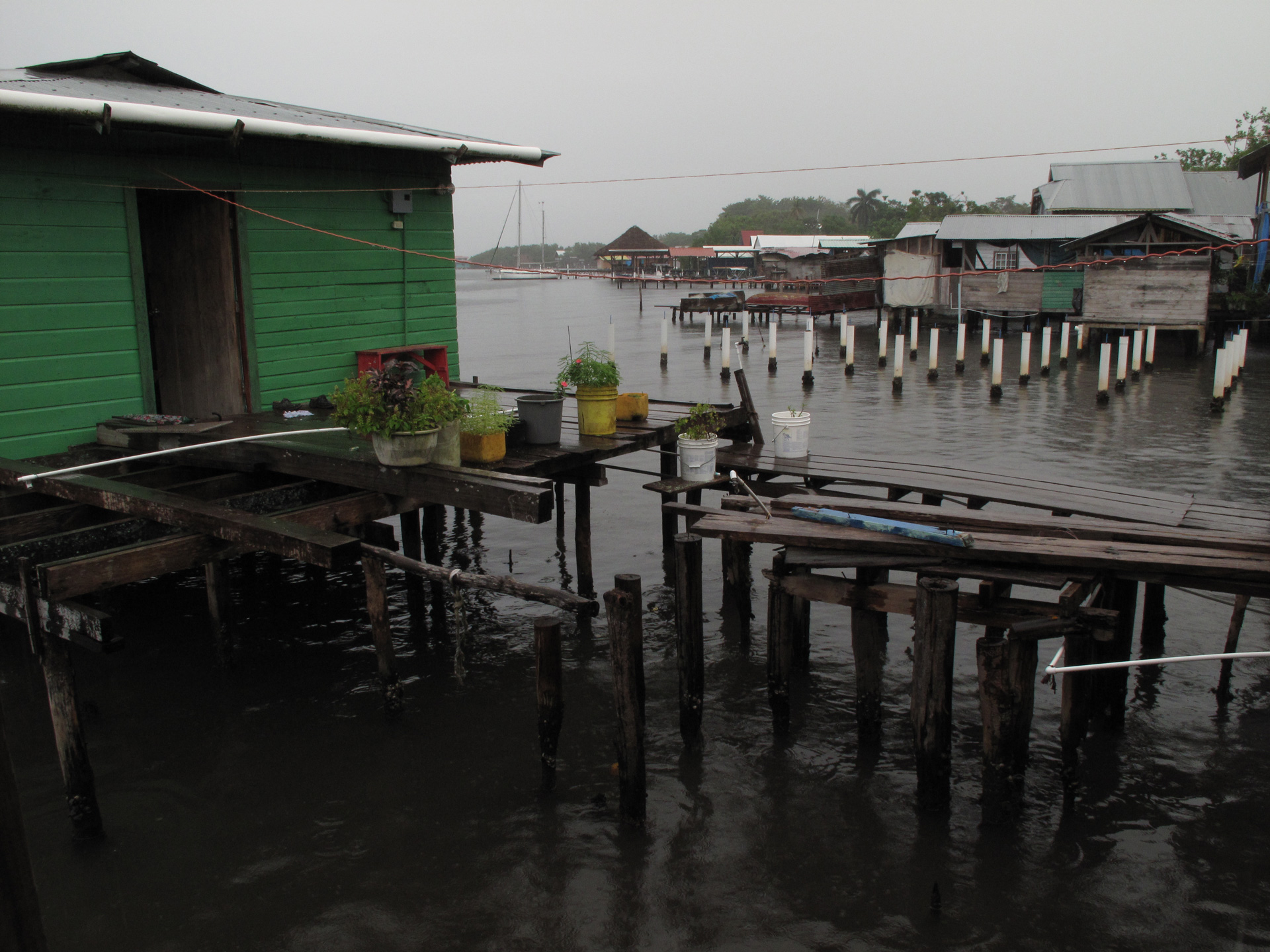
Determined to beat my writer’s block, I closed my eyes and tried to conjure a complete and final image of Wild Bill. He appeared to me at the precipice with his gun, a brooding storm of dark and terrible omniscience. But this was a lie, a mirage: Bill was no god.
In reality, he was like some bully huntsman, who after tracking an animal across the wilderness, murders it at a sly and opportune moment, cuts off its horns and leaves the carcass to rot in the undergrowth. For all his work, he considers himself a very skilled and able sportsman, never realising he is a nothing but a petty sadist and a tyrant.
I picked up my pen and wrote down the words:
“I was lying in a hammock in a half-fallen shack on the water…”
Source: Perceptive Travel



